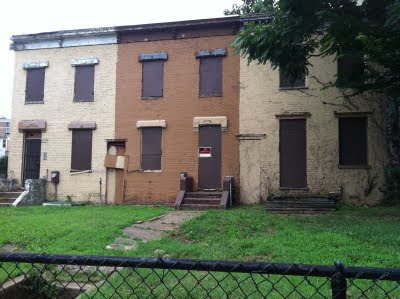
Making good on that promise, the Church is seeking to fully demolish the property by petitioning the Mayor's Agent with the plea of economic burden, a move that the HPO has just opposed.
 The three rowhouses next to the Church on New Jersey Avenue date back to 1866, but have become severely decrepit in the last few decades of life. Still, HPRB determined that the front façades and brick party walls of the rowhouses maintained their integrity and could be braced and retained, resulting in the call for partial preservation this summer.
The three rowhouses next to the Church on New Jersey Avenue date back to 1866, but have become severely decrepit in the last few decades of life. Still, HPRB determined that the front façades and brick party walls of the rowhouses maintained their integrity and could be braced and retained, resulting in the call for partial preservation this summer.The most recent HPO report opposing the Church's full raze petition says "The conditions at 1234 and 1236 can largely be blamed on 20 years of deferred maintenance...the Board has always stood against approving razes of buildings brought to a state of dilapidation by lack of maintenance, as approval would not only result in the loss of historic fabric and character in the particular, but would reward and encourage such neglect in general."
If the Mayor's Agent does approve the Church's petition for a full raze, then the cleared site would be incorporated into the Church parking lot, in order to offset the 15 spaces (in the 32 space lot) that will be lost due to the addition on its property at 1208 3rd St.
Washington D.C. real estate development news













